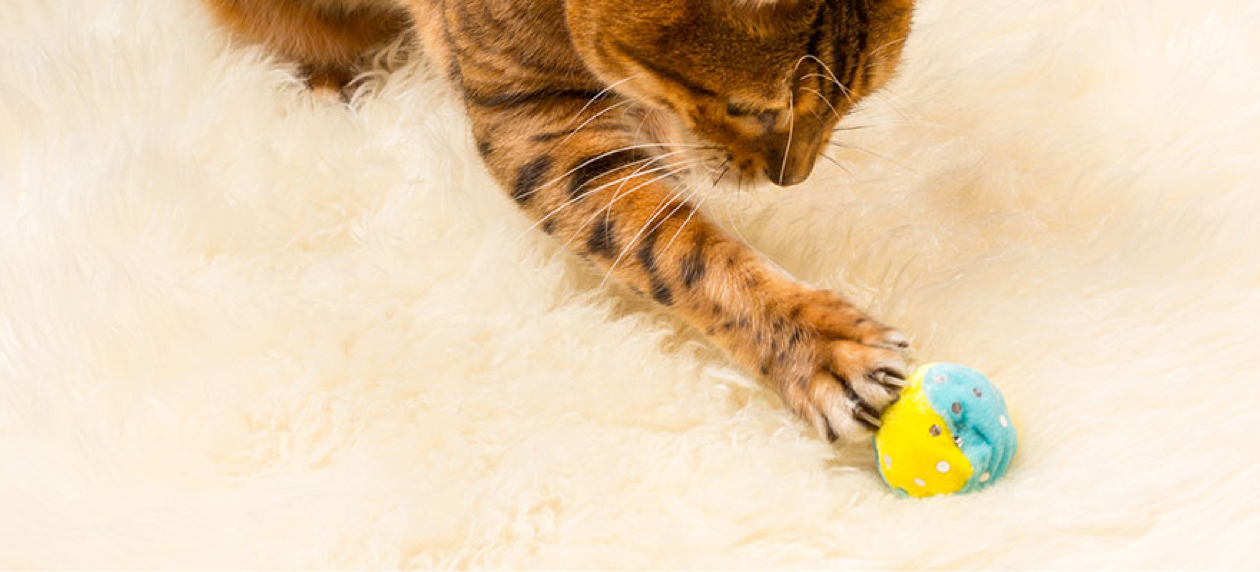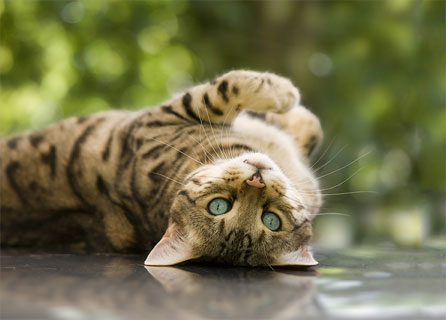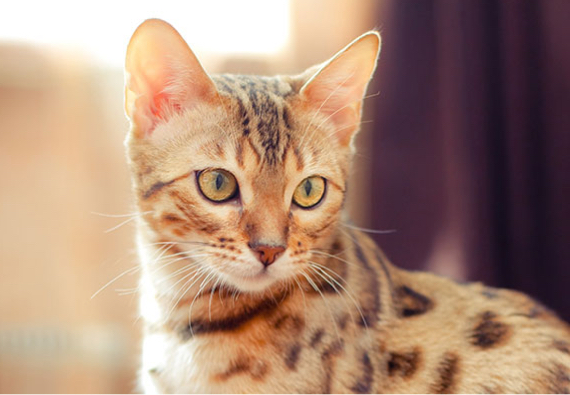
Bengal breed guide
Loyal and entertaining, with a cheeky personality. The Bengal is graceful, loving and energetic, with sleek fur patterned with striking leopard-like spots. Learn more about this friendly, smart and playful cat, from their grooming and exercise needs to the things you can do to keep them happy and healthy.
Breed information and advice
A cross-breed combining the Asian Leopard and the domestic cat, the short-haired Bengal has a wild athletic look. But do not be fooled as they're exceptionally friendly and will follow their owner from room to room when at home. Here's more you should know:
- The Bengal is an affectionate breed, said to be more like a dog than a cat due to their fondness for their human owners.The Bengal is an affectionate breed, said to be more like a dog than a cat due to their fondness for their human owners.
- It’s a good idea to brush and rub down your cat on a weekly basis, to remove loose hairs and maintain their plush coat.It’s a good idea to brush and rub down your cat on a weekly basis, to remove loose hairs and maintain their plush coat.
- They'll typically weigh between 4.5kg and 9kg, when fully grown.They'll typically weigh between 4.5kg and 9kg, when fully grown.
- A healthy Bengal will usually live for 10 to 15 years.A healthy Bengal will usually live for 10 to 15 years.
Typical size of a Bengal Cat: Large

Recommended exercise and nutrition
The athletic Bengal is known for their high energy levels and will find time to blow off steam by racing around the house or garden, scaling obstacles, or entertaining themselves with a game. However, they also love their downtime and once they've fully exerted themselves, you'll find them crashed out in an exhausted heap.
As one of the more active breeds of cat, try to find time to play with them on a daily basis. Whether you want to play with a feather on a string or teach them tricks - as they're smart - invest time in games, and you will be rewarded as this time will help you form a stronger bond. Kittens and cats have higher energy levels first thing in the morning and late at night.
Thanks to their ancestry, Bengals will need a diet of mainly raw meat and fish, but you can also feed them pre-packaged cat food too. If you decided to feed a raw food diet then this should be done in conjunction with advice from your vet in order to ensure they’re getting a balanced and safe diet. Bengals need high quality meals twice a day, although exactly how much will depend on their size, age and activity levels. Check the food packets or speak to your vet for help with portion sizes.
Intelligent and full of energy
A Bengal is highly energetic and intelligent and loves to play, so find games that help them to imitate their hunter instinct and stimulate their brain.

Common health problems and illnesses
Your Bengal will need all of the usual vaccinations and check-ups to help protect them against common ailments. There are some conditions which this breed is more prone to though, and you may want to familiarise yourself with the symptoms, so you know what to look out for.
Bengals are prone to a deficiency in the enzyme Pyruvate Kinase, which impairs the red blood cells' ability to metabolize, which may lead to anemia and other blood-related issues. This condition is typically associated with a genetic defect at birth. Cats that undergo a bone marrow transplant may have a normal lifespan. Unfortunately, this is life threatening for those that are left untreated. Please speak to your vet if you have any concerns.
Bengals are prone to hip dysplasia, an abnormal development of the hip joint which can lead to arthritis. Bengals who suffer from a severe form of this condition may become lame by six months of age. This is a degenerative disease, meaning that it worsens over time. Your vet will be able to do a physical exam if you have any concerns.
A common injury affecting this breed is a dislocated kneecap, also known as a luxating patella. Simple surgery is usually the best way to treat this condition, but your vet can advise on the best course of action.
Cardiomyopathy relates to any disease that affects a cat’s heart muscle, and can affect this breed. Hypertrophic cardiomyopathy is one of the more common of these heart conditions and causes thickening of the heart’s muscles, making it more difficult for the organ to relax between contractions. Keep an eye out for any signs in your cat such as loss of appetite, weakness or difficulty breathing. Speak to your vet, who will be able to do a full examination and advise on treatment options, if you have any concerns.
Feline infectious peritonitis (FIP) is a viral disease of cats caused by certain strains of a virus called the feline coronavirus. Most strains of FIP can be very difficult to diagnose because it can infect many organ systems, ranging from the abdomen to the eyes to the central nervous system. Although FIP is not believed to be contagious, it's a very serious disease. When a cat gets FIP, it is progressive and almost always fatal. You should speak to your vet if you have concerns and they can help you decide which treatment option is best for your cat.
Find out about insurance for your Bengal
Learn how pet insurance works and what kind of cover you might need for your cat.
Grooming advice
A Bengal’s unique, short-haired coat is fairly delicate, and will only need to be groomed once a week - any brushing or cleaning should be carefully undertaken. To keep their fur looking fresh, either groom using a wet hand, wipe their fur down with a damp cloth such as chamois leather or gently brush them from head to tail.
Get into a routine when they're a kitten and not only will this keep them looking their best, but it will also allow you to check for hair loss or skin ailments while helping you to build a strong bond.
A good dental routine is hugely important to remove any plaque or tartar from their mouth, so try weekly (if not daily) to brush their teeth using a special toothbrush and paste.
Your Bengal will appreciate having a scratching post to keep their claws trim, but you may also have to cut them every couple of weeks. Check their ears for dirt and infection each week, and wipe under your cat’s eyes if there is a build-up of any gooey liquid.
Fun and interesting facts
- They're so sought after that a British woman once paid £35,000 for her Bengal cat, dubbing the breed the Rolls Royce of the feline world.
- They're also the cat burglar of the feline world - if your jewellery goes missing you might find it was an inside job, as your cat will love to play with all things shiny.
- The Bengal is fearless when it comes to water and will enjoy jumping in your bath or playing in a pond.
- If they go missing, look up, as this cat is famed for their climbing skills and will scale almost anything.
- Their name is derived from the Latin for the Asian Leopard cat, Felis Bengalensis.
Important information
The content on this page aims to offer an informative introduction to pet breeds, but does not constitute expert veterinary advice. If your dog or cat falls ill or has an injury, contact your vet immediately.
All facts and figures were correct at date of publication and were compiled using a range of sources.
Discover more breeds
Browse our other cat and dog guides to learn about some of the UK’s most popular breeds.